英语句子成分分析详细PPT课件
合集下载
英语句子成分分析PPT课件

.
27
Tips
①单词作定语时一般放在被修饰的名词前面,而且有一定的次序。 冠词/物主代词+大小+形状+新旧+色彩+国家/来源+材料/目的 好大方的舅舅严国财 ②时间副词(now,then,today,yesterday..)地点副词(here,there, back,in,out,hom)作定语时放在被修饰的名词后面。
如: Keep the keyboards clean, children. (孩子们请保持键盘的清洁)
.
9
(8)主谓一致(单复数保持一 致)
如:
Neither Jim nor Rose has passed the exam. (Jim和Rose都没有通过考试)
The Chinese people are a hardworking and brave people. (中华民族是一个勤劳勇敢的民族)
He does not feel like eating anything today.
(他今天不想吃认可东西) .
32
Tips
①表语只能放在连系动词(look,be,become,turn,get,grow,feel,seem) 之后。
②只能做表语的形容词sorry afraid,alone,asleep,awake,ill,well,sure,interested
.
10
谓语(predicate)
表示主语的行为或进行的动作。
.
11
1)由实意动词充当
如:
He travelled in space for thr first time. (他首次在太空旅行)
Who teaches you English this year? (今年谁教你们英语?)
英语句子成分讲解超级详细ppt课件

这个计划证明是可行的。 _T_h_e_p_l_an__tu_r_n_ed__o_u_t/_pr_o_v_e_d_(_t_o_b_e_)_p_r_a_c_tic_a_l_. ________.
认识到了贫困户贫困的根本原因,才 能开始 对症下 药,然 后药到 病除。 近年来 国家对 扶贫工 作高度 重视, 已经展 开了“ 精准扶 贫”项 目
英语的句子成分:
一) 主语:
Walls have ears.
名词
He will take you to the hospital. 代词
Three plus four equals seven. 数词
To see is to believe.
to do不定式
Smoking is not allowed in public places. doing动名词 Whether or not they will come depends on the weather. 句子
Do you mind opening the window? 动名词
Give me four please.
代词和数词
He wants to dream a nice dream. to do不定式
We need know whae should care more about our friends. 介词+名词
I left the village five years ago.
时间状语
I arrived late because of the traffic jam . 原因状语
We'll send a car to fetch you.
目的状语
The fish can eat a person in two minutes , leaving
认识到了贫困户贫困的根本原因,才 能开始 对症下 药,然 后药到 病除。 近年来 国家对 扶贫工 作高度 重视, 已经展 开了“ 精准扶 贫”项 目
英语的句子成分:
一) 主语:
Walls have ears.
名词
He will take you to the hospital. 代词
Three plus four equals seven. 数词
To see is to believe.
to do不定式
Smoking is not allowed in public places. doing动名词 Whether or not they will come depends on the weather. 句子
Do you mind opening the window? 动名词
Give me four please.
代词和数词
He wants to dream a nice dream. to do不定式
We need know whae should care more about our friends. 介词+名词
I left the village five years ago.
时间状语
I arrived late because of the traffic jam . 原因状语
We'll send a car to fetch you.
目的状语
The fish can eat a person in two minutes , leaving
英语句子结构分析1.句子成分ppt课件

❖ He often helps me do my lessons.(他常常 帮我做功课) /
❖ The teacher wanted me to learn French all by myself.(老师要我自学法语)
8☆同位语通常紧跟在名词、代词后面,进一步 说明它的情况。
❖ 如:Where is your classmate Tom ?(你的
I like China. (名词)
He hates you. (代词)
How many do you need? We need two. (数 词)
I enjoy working with you. (动名词)
I hope to see you again. (不定式)
Did you write down what he said? (宾语从
pronunciation. ❖ ④ How many new words did you learn last
class? ❖ ⑤ Some of the students in the school want
to go swimming.
❖
his homework ② English ③ your pronunciation ④ new words ⑤ to go swimming
④ To do today's homework without the teacher's help is very difficult.
可编辑课件
9
谓语(predicate):是对主语加以陈述,表示主语的行 为或状态,常用动词或者动词词组担任,放在主语的 后面。
We study English. He is asleep.
《英语句子成分分析》课件

状语
修饰动词、形容词或副 词,描述动作发生的方 式、时间、地点等。
句子的五种基本语序
介绍英语句子的五种基本语序及其使用情况,帮助理解句子成分的排列顺序。
1 SVO语序
主语、谓语、宾语的一般语序。
2 SVC语序
主语、谓语、表语的语序,用于描述主语的状态。
3 SOV语序
4 VSO语序
主语、宾语、谓语的语序,常见于一些非主流语 言。
《英语句子成分分析》 PPT课件
探索英语句子成分分析的奥妙,从基本组成部分到复杂应用的全面介绍。
概述:英语句子成分分析
通过深入分析英语句子的构成,掌握句子中的各个成分及其关系,从而更好地理解和运用英语。
1 基础知识
了解句子成分分析的概念和重要性。
2 学习目标
制定学习计划,提高句子成分分析技能。
3 学习方法
谓语、主语、宾语的语序,用于强调动作或在疑 问句中。
宾语和间接宾语
详细探讨宾语和间接宾语在句子中的角色和用法,加深理解并提升句子分析能力。
直接宾语
直接接受动作的宾语。
间接宾语
表示动பைடு நூலகம்的接受者或受益者。
双宾语
同时出现的直接宾语和间接宾 语。
状语和它的种类
介绍状语的作用和分类,加深理解并提高句子成分分析的准确性。
份。
介词短语等。
主、宾语从句
介绍主语从句和宾语从句的构建和应用,帮助分析复杂句子结构。
主语从句
作为主语的从句。
宾语从句
作为宾语的从句。
常用的从句引导词
that, whether, if, when, where, why 等。
掌握有效的句子成分分析步骤和技巧。
英语句子成分讲解清晰PPT课件

, 时le间a状v语ing
only
•
The students
dancing.
came
into
the
classroom,
s i n g i n原目g因的状状a n语语d
• If he goes, so will I . • Though he is a child, he knows a lot.
结果状语
• 这个计划证明是可行的。__________________________________________.
The hot day will remain/stay/ keep a few days.
The plan turned out/proved (to be) practical.
第11页/共21页
2.主语 + 谓语 1)Building has started.
主语 谓语 2)The train leaves at 7:40.
主语 谓语 • ______搭配:The teacher teaches well.
动词副词The child walks ver y slowly. • _____搭配: The girl looked at the picture.
数词
• Those who want to go to Tibet are to sig形n容t词h/e序i数r 词na/tomdeos不h定e式re.
现在分词 doing
to do 不定式
从句
第5页/共21页
六)状语 状语表示地点、时间、原因、目的、结果、条
件、让步、伴随情况等。
• The best fish swim near the bottom.
英语句子成分分析分析解析(课堂PPT)(2024版)

6. I prefer my coffee hot.
7. Don’t worry about me; just take care of yourself.
8. You can rely on him to do anything that is necessary.
与全句没有什 么语法关系, 有感叹词、肯 定与否定的答 语、插入语、 呼语等
常用词 例句 类
名词、 I find the book very boring. 形容词, 分词, 不定式 介词短 语等
名词、 This is Mr. Li, our 数词、 headmaster. 代词或 The news that he is ill 从句 worries us.
2024/11/13
14
主动语态变成被动语态后, 宾语补足语变成主补.
I last saw him playing near the river. →He was seen playing near the river. The teacher caught the student cheating →in the exam.
machine off. ● She wondered why Jim was so angry
with her.
2024/11/13
13
㈤宾语补足语
We must keep it a secret.
I found the book interesting.
Please keep the dog out.
The student was caught cheating in the exam.
We elected him monitor. →He was elected monitor.
初中英语句子成分分析课件(共70张PPT)

2
什么是句子?
句子是由词按照一定的语法结构组成的,是能表达 一个完整概念的语言单位.句子的第一个字母必须 大写,结尾要有?. ! 主语和谓语是一句子中不可缺少的成分.
I am a teacher. Are you a student? How beautiful the girl is !
3
句子包括哪些成分?
22
She is a beautiful girl.
23
句子成分(2) 定状补 表
24
Hale Waihona Puke 表语说明主语“是什么”, “怎么样” 位于系动词 之后 Her mother is a bank clerk.
The food tastes delicious.
表语说明主语是什么,或者怎么样,由名词,形容词, 副词,介词短语,不定式,动名词,短语,或者从句充当.表语位于系动词后面.
14
动词常分为实义动词,连系动词,情态动词和助动词. △情态动词和助动词不能单独充当谓语,必须 和实义动词或系动词一起构成谓语.
They can speak English well. They are playing over there.
15
谓语在哪里
They enjoyed playing computer games.
1) It is wrong to tell a lie. (
说谎是错)误的。
2) He is clever a lot.
3) It is getting clod
4) It is easy for me to play the piano.
5) The teacher is kind to us.
20
宾语在哪里
什么是句子?
句子是由词按照一定的语法结构组成的,是能表达 一个完整概念的语言单位.句子的第一个字母必须 大写,结尾要有?. ! 主语和谓语是一句子中不可缺少的成分.
I am a teacher. Are you a student? How beautiful the girl is !
3
句子包括哪些成分?
22
She is a beautiful girl.
23
句子成分(2) 定状补 表
24
Hale Waihona Puke 表语说明主语“是什么”, “怎么样” 位于系动词 之后 Her mother is a bank clerk.
The food tastes delicious.
表语说明主语是什么,或者怎么样,由名词,形容词, 副词,介词短语,不定式,动名词,短语,或者从句充当.表语位于系动词后面.
14
动词常分为实义动词,连系动词,情态动词和助动词. △情态动词和助动词不能单独充当谓语,必须 和实义动词或系动词一起构成谓语.
They can speak English well. They are playing over there.
15
谓语在哪里
They enjoyed playing computer games.
1) It is wrong to tell a lie. (
说谎是错)误的。
2) He is clever a lot.
3) It is getting clod
4) It is easy for me to play the piano.
5) The teacher is kind to us.
20
宾语在哪里
高中英语语法-句子成分ppt课件
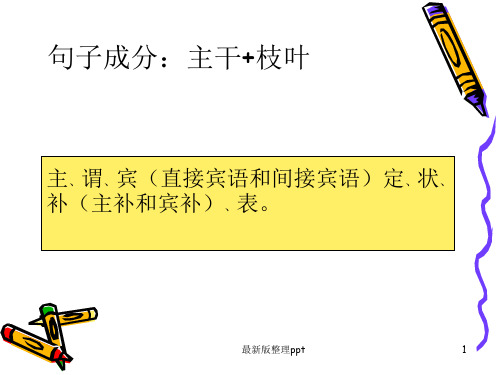
• Children who live by the sea usually begin to swim at an early age.
定语:限定或修饰名词或相当于名词的词
常由形容词或相当于形容词的短语
或从句担任,形容词位于名词之前
短语或从句置于名词之后。
最新版整理ppt
7
句子成分
• The parents named their baby Tony.
谓语
宾语
状语
宾语:及物动词的动作对象和介词所联系
的对象,常由名词或相当于名词的
词担任,位于动词或介词之后
最新版整理ppt
4
句子成分
• My brother teaches English at a school.
主语
谓语
宾语
状语
状语:修饰动词,形容词,副词以及全句
常由副词或相当于副词的词组担任
可置于动词之前或之后
补语:用来补充主语和宾语的意义 一般都着重说明主语或宾语的身份
或特征
最新版整理ppt
8
句子基本结构
1. Day dawns. 天亮了。
主语S
谓语V
2. Tom is a professor.
主语S 连系动词L
表语P
最新版. Ruth understands French.
句子成分:主干+枝叶
主、谓、宾(直接宾语和间接宾语)定、状、 补(主补和宾补)、表。
最新版整理ppt
1
句子成分
• My brother teaches English at a school.
主语
谓语
宾语
状语
主语:一句话的主体,英语句子中不可
英语句子成分简单版ppt课件
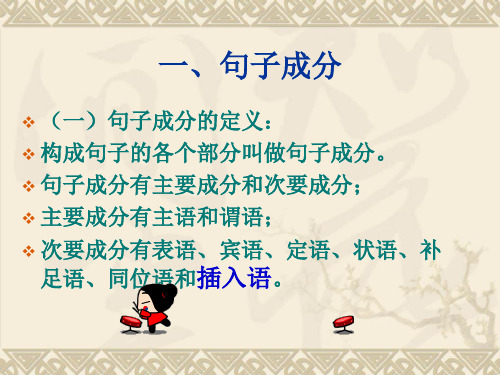
abroad. (表语从句)
经营者提供商品或者服务有欺诈行为 的,应 当按照 消费者 的要求 增加赔 偿其受 到的损 失,增 加赔偿 的金额 为消费 者购买 商品的 价款或 接受服 务的费 用
注意:系动词(Linking verb)用于连接主语和 表语,说明主语的状态,性质特征和身份等。
1)状态系动词用来表示主语状态,只有be一词, 例如: He is a teacher.
经营者提供商品或者服务有欺诈行为 的,应 当按照 消费者 的要求 增加赔 偿其受 到的损 失,增 加赔偿 的金额 为消费 者购买 商品的 价款或 接受服 务的费 用
1.During the 1990s, American country music has become more and more popular. (名词)
5)变化系动词表示主语变成什么样,主要有 become, grow, turn, fall, get, go, come, run.例如: The river was beginning to run dry.
6)终止系动词表示主语已终止动作,主要有 prove, turn out, 表达"结果是;证明是 ",之意, 例如: The rumor proved false. His plan turned out a success.
John has admitted breaking the window .
经营者提供商品或者服务有欺诈行为 的,应 当按照 消费者 的要求 增加赔 偿其受 到的损 失,增 加赔偿 的金额 为消费 者购买 商品的 价款或 接受服 务的费 用
❖ 下列动词既可接不定式,也可接动名词做 宾语,但意义不同,如mean, try, remember, forget, regret等。
经营者提供商品或者服务有欺诈行为 的,应 当按照 消费者 的要求 增加赔 偿其受 到的损 失,增 加赔偿 的金额 为消费 者购买 商品的 价款或 接受服 务的费 用
注意:系动词(Linking verb)用于连接主语和 表语,说明主语的状态,性质特征和身份等。
1)状态系动词用来表示主语状态,只有be一词, 例如: He is a teacher.
经营者提供商品或者服务有欺诈行为 的,应 当按照 消费者 的要求 增加赔 偿其受 到的损 失,增 加赔偿 的金额 为消费 者购买 商品的 价款或 接受服 务的费 用
1.During the 1990s, American country music has become more and more popular. (名词)
5)变化系动词表示主语变成什么样,主要有 become, grow, turn, fall, get, go, come, run.例如: The river was beginning to run dry.
6)终止系动词表示主语已终止动作,主要有 prove, turn out, 表达"结果是;证明是 ",之意, 例如: The rumor proved false. His plan turned out a success.
John has admitted breaking the window .
经营者提供商品或者服务有欺诈行为 的,应 当按照 消费者 的要求 增加赔 偿其受 到的损 失,增 加赔偿 的金额 为消费 者购买 商品的 价款或 接受服 务的费 用
❖ 下列动词既可接不定式,也可接动名词做 宾语,但意义不同,如mean, try, remember, forget, regret等。
初中英语句子成分分析课件(共70张PPT)
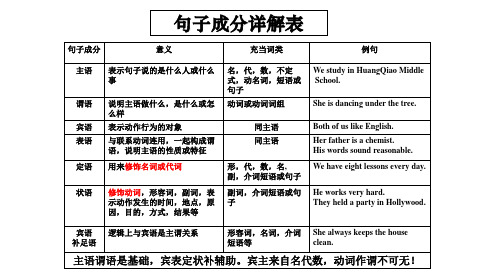
• 宾语是动作,行为的对象,由名词,代词,短 语,不定式,动名词,从句充当.它和及物动 词一起说明主语做了什么,在谓语、介词之 后.
宾语:动作行为的对象,说明主语做什么。一般放在 及物动词 或_______ _________ 介词 后面.
1.We study English. 2.Our teacher said that he would go there. 3.He is looking at the dog. △双宾语:指人的是间接宾语,指物的是直接宾语。 He gave me two books.
动词常分为实义动词,连系动词,情态动词和助动词. 情态动词和助动词不能单独充当谓语,必须 和实义动词或系动词一起构成谓语.
△
They can speak English well. They are playing over there.
谓语在哪里
They enjoyed playing computer games. He looked after two boys.
三、定语 定语可以用下面这些东西表示: 1. It’s a red car.( 形容词 ) 2.They live in the room above.( 副词 ) 3.My brother is a teacher.( 代词 ) 4.We belong to the third world.( 数词 ) 5. Lucy’s father is a poor worker.( 名词所有格 ) 6.Mother made a birthday cake for me.( 名词 ) 7.The man under the tree is my teacher.( 介词短语 ) 8.The swimming boy is my brother./The boy swimming in the river is my brother. ( 现在分词 )
高考英语句子成分及句子基本结构(共32张PPT)(2024版)

class? • ⑤ Some of the students in the school want to
go swimming, how about you?
(四)表语
• 表语说明主语的性质、特征、状态或身份, 与连系动词一起构成复合谓语。
• We are Chinese. (名词) • I’m not quite myself today. (代词) • Who was the first? (数词) • The war was over. (副词) • He is out of condition. (介词短词) • They seem to know the truth. (动词不定式) • His hobby is playing computer games.(动名词短语) • That is what he told me yesterday. (从词)
• ② There is an old man coming here.
(名词)
• ③To do today's homework without the teacher's help is very difficult.
(不定式)
㈡谓语 说明主语的动作、状态和特征
• 谓语由简单谓语和复合谓语组成。 • ①简单谓语 • The sun rises in the east. • He looked after two orphans. • ②复合谓语 由情态动词或助动词+动词; • He can speak English very well. • The work must be done before three o’clock.
• Do you know the man who spoke just now?
go swimming, how about you?
(四)表语
• 表语说明主语的性质、特征、状态或身份, 与连系动词一起构成复合谓语。
• We are Chinese. (名词) • I’m not quite myself today. (代词) • Who was the first? (数词) • The war was over. (副词) • He is out of condition. (介词短词) • They seem to know the truth. (动词不定式) • His hobby is playing computer games.(动名词短语) • That is what he told me yesterday. (从词)
• ② There is an old man coming here.
(名词)
• ③To do today's homework without the teacher's help is very difficult.
(不定式)
㈡谓语 说明主语的动作、状态和特征
• 谓语由简单谓语和复合谓语组成。 • ①简单谓语 • The sun rises in the east. • He looked after two orphans. • ②复合谓语 由情态动词或助动词+动词; • He can speak English very well. • The work must be done before three o’clock.
• Do you know the man who spoke just now?
英语句子结构分析-ppt
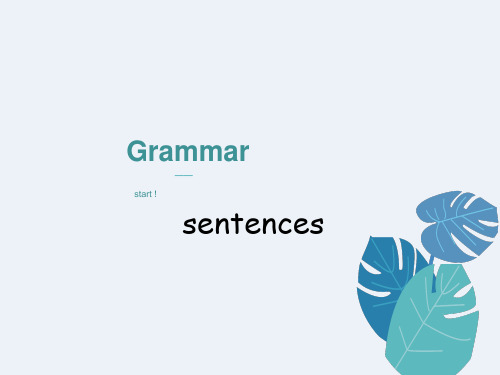
Boys (in this room) are in Class Nine.
Her friend bought her a birthday gift.
The girl (in red) is my sister. 穿红色衣服的女孩是我的妹妹。 她的朋友给她买了一个生日礼物。
This is me and these are my friends. They must stay in water, or they will die. It’s not cheap, but it is very good. It was late, so I went to bed.
sentences
Grammar
start !
句子成份
★ 句子成份:
主·
谓·
宾·
表
补
定·
状·
S:Subject (主语)
名词: 代词: 动名词: 不定式 主语从句
(n. & n.短语)
指示代词 人称代词 主格 形容词性物主代词 + n.
02
我们坐火车去那里并待了五天。
03
这是一个非常美丽的地方。这里有很多美景和美食。
世界那么大,我想去看看。
我们吃了桂林米粉,它是桂林的象征。
房间太小坐不下。
01
02
03
( My job is to look after baby. )
( I feel sorry for what I said. )
定语:用来修饰名词或代词的成分,常用形容词。 This is a red sun. He is a tall boy. 状语: 用来修饰动词、形容词、副词或整个句子的成分。常用副词,表时间、地点、原因、方式、目的、程度等的短语。 The students study hard. I often write to him. 补语: 对句子中某些成分主语、表语、宾语进行补 充说明。 We made King monitor.
Her friend bought her a birthday gift.
The girl (in red) is my sister. 穿红色衣服的女孩是我的妹妹。 她的朋友给她买了一个生日礼物。
This is me and these are my friends. They must stay in water, or they will die. It’s not cheap, but it is very good. It was late, so I went to bed.
sentences
Grammar
start !
句子成份
★ 句子成份:
主·
谓·
宾·
表
补
定·
状·
S:Subject (主语)
名词: 代词: 动名词: 不定式 主语从句
(n. & n.短语)
指示代词 人称代词 主格 形容词性物主代词 + n.
02
我们坐火车去那里并待了五天。
03
这是一个非常美丽的地方。这里有很多美景和美食。
世界那么大,我想去看看。
我们吃了桂林米粉,它是桂林的象征。
房间太小坐不下。
01
02
03
( My job is to look after baby. )
( I feel sorry for what I said. )
定语:用来修饰名词或代词的成分,常用形容词。 This is a red sun. He is a tall boy. 状语: 用来修饰动词、形容词、副词或整个句子的成分。常用副词,表时间、地点、原因、方式、目的、程度等的短语。 The students study hard. I often write to him. 补语: 对句子中某些成分主语、表语、宾语进行补 充说明。 We made King monitor.
《英语句子成分》优秀课件PPT课件
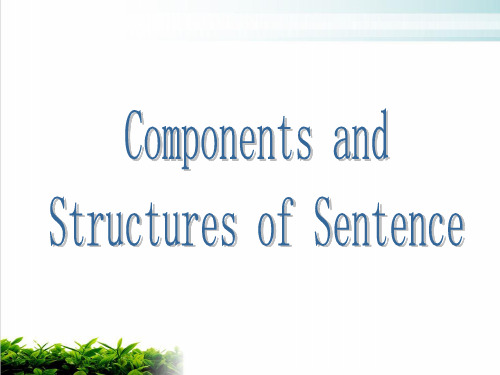
1) It is wrong to tell a lie. ( 说谎是错误的。) 2) It is no use arguing about it. ( 争吵是没用的。) 3) It is uncertain who will come. ( 谁要来还不确定。)
二、谓语
Predicate:说明主语做什么或怎么样。通常 由_动__词___ 充当。动词常分为实义动词,连系 动词,情态动词和助动词.
(it作形式主语,真正的主语为后面的不定式)
什么情况下用it作形式主语?
当不定式、动名词或从句在某个句子 中作主语时,为保持句子结构前后平衡, 避免头重脚轻,因此常用it作形式主语置 于句首,而将真正的主语放在句尾。此时 it只起先行引导作用,本身无词义。
你能划出下列句子的真正的主语吗?你懂得 翻译下列句子吗?
8.She works very hard though she is old.
(让步状语)
9.I am taller than he is. (比较状语)
七、补语
• Complement是用于补充说明主语或宾语的 身份或特征。
Everyone calls him Jack. (宾补) He is called Jack.(主补)
• 1、简单谓语:由一个动词或动词短语构成。如: He practices running every morning. The plane took off at ten o’clock.
• 2、复合谓语: (1)由情态动词加动词原形构成。如:
You may keep the book for two weeks. (2)由助动词加动词原形,现在分词,过去分词构
great care. (方式状语)
二、谓语
Predicate:说明主语做什么或怎么样。通常 由_动__词___ 充当。动词常分为实义动词,连系 动词,情态动词和助动词.
(it作形式主语,真正的主语为后面的不定式)
什么情况下用it作形式主语?
当不定式、动名词或从句在某个句子 中作主语时,为保持句子结构前后平衡, 避免头重脚轻,因此常用it作形式主语置 于句首,而将真正的主语放在句尾。此时 it只起先行引导作用,本身无词义。
你能划出下列句子的真正的主语吗?你懂得 翻译下列句子吗?
8.She works very hard though she is old.
(让步状语)
9.I am taller than he is. (比较状语)
七、补语
• Complement是用于补充说明主语或宾语的 身份或特征。
Everyone calls him Jack. (宾补) He is called Jack.(主补)
• 1、简单谓语:由一个动词或动词短语构成。如: He practices running every morning. The plane took off at ten o’clock.
• 2、复合谓语: (1)由情态动词加动词原形构成。如:
You may keep the book for two weeks. (2)由助动词加动词原形,现在分词,过去分词构
great care. (方式状语)
英语句子成分详细讲解课件(共34张)

on the left. • ⑨ You will find it useful after you leave school. • ⑩ They didn't know who "Father Christmas" really is.
• (四) 挑出下列句中的表语
• ① The old man was feeling very tired. • ② Why is he worried about Jim? • ③ The leaves have turned yellow. • ④ Soon They all became interested in the
花了很长时间他才熟悉通往鸟巢形的体育馆的路。
It took him quite a little time to get familiar with the routes l_e_a_d_in_g_ to the nest-shaped stadium.
定语
• He is a clever boy. (形容词) • They are building a stone bridge. (名词) • There are 54 students in our class. (数词) • Do you known Betty’s sister? (名词的所有格) • He bought some sleeping pills. (动名词) • There is a sleeping baby in bed. (现在分词) • His spoken language is good. (过去分词) • I met a friend on my way home. (副词)
那个男孩从树上掉下来了,头撞到地上了.
• (四) 挑出下列句中的表语
• ① The old man was feeling very tired. • ② Why is he worried about Jim? • ③ The leaves have turned yellow. • ④ Soon They all became interested in the
花了很长时间他才熟悉通往鸟巢形的体育馆的路。
It took him quite a little time to get familiar with the routes l_e_a_d_in_g_ to the nest-shaped stadium.
定语
• He is a clever boy. (形容词) • They are building a stone bridge. (名词) • There are 54 students in our class. (数词) • Do you known Betty’s sister? (名词的所有格) • He bought some sleeping pills. (动名词) • There is a sleeping baby in bed. (现在分词) • His spoken language is good. (过去分词) • I met a friend on my way home. (副词)
那个男孩从树上掉下来了,头撞到地上了.
英语句子成分详解ppt课件
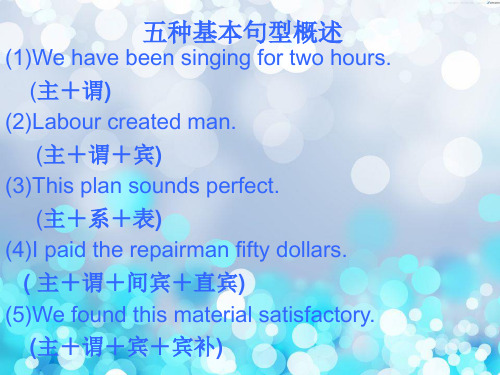
girls.
(数词)
4.To swim in the river is a great pleasure.
(不定式)
5.Smoking does harm to the health. (动名词)
6.The rich should help the poor.
(名词化的形容词)
认识到了贫困户贫困的根本原因,才 能开始 对症下 药,然 后药到 病除。 近年来 国家对 扶贫工 作高度 重视, 已经展 开了“ 精准扶 贫”项 目
(宾语从句)
认识到了贫困户贫困的根本原因,才 能开始 对症下 药,然 后药到 病除。 近年来 国家对 扶贫工 作高度 重视, 已经展 开了“ 精准扶 贫”项 目
❖ 宾语种类: ❖ (1)双宾语(间接宾语+直接宾语),例如:
Lend me your dictionary, please. To: write, tell, pass, give, send, promise, show,
认识到了贫困户贫困的根本原因,才 能开始 对症下 药,然 后药到 病除。 近年来 国家对 扶贫工 作高度 重视, 已经展 开了“ 精准扶 贫”项 目
6.His job is to teach English. (不定式) 7.His hobby is playing football. (动名词) 8.The meeting is of great importance. (介词短语) 9.Time is up. The class is over. (副词) 10.The truth is that he has never been
认识到了贫困户贫困的根本原因,才 能开始 对症下 药,然 后药到 病除。 近年来 国家对 扶贫工 作高度 重视, 已经展 开了“ 精准扶 贫”项 目
相关主题
- 1、下载文档前请自行甄别文档内容的完整性,平台不提供额外的编辑、内容补充、找答案等附加服务。
- 2、"仅部分预览"的文档,不可在线预览部分如存在完整性等问题,可反馈申请退款(可完整预览的文档不适用该条件!)。
- 3、如文档侵犯您的权益,请联系客服反馈,我们会尽快为您处理(人工客服工作时间:9:00-18:30)。
become, grow, turn, fall, get, go, come, run. 例如: He became mad after that.
自那之后,他疯了。 6)终止系动词
prove, turn out, 表达“证实”,“变成”之意 例如: The rumor proved false.
.
(六)状语
状语的功用:状语说明地点、时间、原因、目的、 结果、条件、方向、程度、方式和伴随状况等。 • I will be back in a while. • They are playing on the playground. • He was late because he got up late. • He got up so late that I missed the train. • I waited to see you. • He often went to school by bus. • His parents died, leaving him an orphan. • Please call me if it is necessary. • This book is very interesting. • He went to school in spite o.f his illness.
(六)宾语补足语
有些及物动词除了有一个直接宾语以外,还要有一个宾 语补足语,说明宾语的身份和状态以补充其意义不足, 使句子的意义完整。这类常用的及物动词有 : make, consider, cause, see, find, call, get, have, let.
• I found the book interesting. • Do you smell something burning? • He made himself known to them. • She asked me to lend her a hand.
.
• 宾语分为直接宾语和间接宾语.直接宾语指 物或事,间接宾语指人或动物.
• He gave me some books.
↓ 间接 宾语
↓ 直接 宾语
●please pass me the book. ●He bought his girlfriend some flowers.
.
(四)表语
在系动词后的部分就是表语 1. The war was over. 2. They seem to know the truth. 3. Time is precious. 4. I’m not quite myself today. 5. That remains a puzzle. 6. I don’t feel at ease.
.
同位语
位于名词或代词后面,说明它们的性质和情况 We young people should respect the old. 名词 He himself will do the experiment. 代词 He is the oldest among them four. 数词 He told me the news that our team won the game. 从句
(It形式主语,主语从句是真正主语)
.
㈡谓语
说明主语的动作、状态和特征 • 简单谓语:由动词或动词词组组成 • I saw the flag on the top of the hill? • He looked after two orphans. • 复合谓语 由情态动词或助动词+动词; • He can speak English well. • She doesn’t seem to like dancing
• What he has said is true.
(句. 子)
找出句中主语
(名词)
The sun rises in the east.
(数词)
Twenty years is a short time in history.
The
poor
are
now
living in the shelter. (动名词)
.
Step Four
Training and Testing
.
系动词
1)状态系动词(be动词) 例如: He is a teacher.
(is与补足语一起说明主语的身份。) 2)持续系动词
keep, rest, remain, stay, lie, stand 例如: He always kept silent at meeting.
.
(三)宾语
动作的对象或承受者——及物动词或介词的宾语
Show your passport, please. (名词 ) She didn't say anything. ( 代词) How many do you want? - I want two. (数词) They sent the injured to hospital. (名词化的形容词) They asked to see my passport. (不定式) I enjoy working with you.(动名词) Did you write down what he said? (句子)
• She went out in a hurry. (代词)
• Four plus four is eight. (数词)
• To go for a travelling to Paris is my
(不定式)
dream.
(动名词)
• Smoking is bad for health.Байду номын сангаас
• The young should respect the (old名. 词化的形容词)
这谣言证实有假。
.
Step Six
Summary:课堂小结
.
.
定语后置:
如果定语是由一个单词表示时,通常要前置。 而由一个词组或一个句子表示时,通常则后置
The girl in red is his sister. We have a lot of work to do. The girl standing under the tree is his daughter. Do you know the man who spoke just now? (定语从句)
他开会时总保持沉默。 3)表像系动词
seem, appear, look, 例如: He looks tired.
他看起来很累。
.
4)感官系动词 feel, smell, sound, taste 例如:This kind of cloth feels very soft. 这种布手感很软。
注意:系动词不用于被动语态. 5)变化系动词
.
(五)定语
修饰或限制名词或代词的词、词组或从句 • He is a clever boy. (形容词) • His father works in a steel work. (名词) • There are 54students in our class. (数词) • Do you known betty’s sister? (名词的所有格) • He bought some sleeping pills. (动名词) • There is a sleeping baby in bed. (现在分词) • His spoken language is good. (过去分词)
英语句子成分分析
.
Step one:
Reviewing Test: 1. I met my best friend Tom at the station yesterday.
.
1. I met my best friend Tom at the station yesterday.
↓↓ ↓
↓↓
↓
主谓 定 宾 同
状
语语 语 语 位
语
语
.
句子成分
定义 :构成句子的各个部分叫做句子成 分。句子成分有主要成分和次要成分; 主要成分:主语和谓语 次要成分:表语、宾语、定语、状语、 补足语、同位语
.
㈠主语(subject)
句子说明的人或事物
• Jane is good at playing the piano. (名词)
(名词化的形容词)
Seeing is believing.
(不定式)
To go for a travell(ing代t词o P)aris is my.
He likes dancing.
(句子)
What he needs is a book.
It was interesting to learn about the Wolong Reserve
自那之后,他疯了。 6)终止系动词
prove, turn out, 表达“证实”,“变成”之意 例如: The rumor proved false.
.
(六)状语
状语的功用:状语说明地点、时间、原因、目的、 结果、条件、方向、程度、方式和伴随状况等。 • I will be back in a while. • They are playing on the playground. • He was late because he got up late. • He got up so late that I missed the train. • I waited to see you. • He often went to school by bus. • His parents died, leaving him an orphan. • Please call me if it is necessary. • This book is very interesting. • He went to school in spite o.f his illness.
(六)宾语补足语
有些及物动词除了有一个直接宾语以外,还要有一个宾 语补足语,说明宾语的身份和状态以补充其意义不足, 使句子的意义完整。这类常用的及物动词有 : make, consider, cause, see, find, call, get, have, let.
• I found the book interesting. • Do you smell something burning? • He made himself known to them. • She asked me to lend her a hand.
.
• 宾语分为直接宾语和间接宾语.直接宾语指 物或事,间接宾语指人或动物.
• He gave me some books.
↓ 间接 宾语
↓ 直接 宾语
●please pass me the book. ●He bought his girlfriend some flowers.
.
(四)表语
在系动词后的部分就是表语 1. The war was over. 2. They seem to know the truth. 3. Time is precious. 4. I’m not quite myself today. 5. That remains a puzzle. 6. I don’t feel at ease.
.
同位语
位于名词或代词后面,说明它们的性质和情况 We young people should respect the old. 名词 He himself will do the experiment. 代词 He is the oldest among them four. 数词 He told me the news that our team won the game. 从句
(It形式主语,主语从句是真正主语)
.
㈡谓语
说明主语的动作、状态和特征 • 简单谓语:由动词或动词词组组成 • I saw the flag on the top of the hill? • He looked after two orphans. • 复合谓语 由情态动词或助动词+动词; • He can speak English well. • She doesn’t seem to like dancing
• What he has said is true.
(句. 子)
找出句中主语
(名词)
The sun rises in the east.
(数词)
Twenty years is a short time in history.
The
poor
are
now
living in the shelter. (动名词)
.
Step Four
Training and Testing
.
系动词
1)状态系动词(be动词) 例如: He is a teacher.
(is与补足语一起说明主语的身份。) 2)持续系动词
keep, rest, remain, stay, lie, stand 例如: He always kept silent at meeting.
.
(三)宾语
动作的对象或承受者——及物动词或介词的宾语
Show your passport, please. (名词 ) She didn't say anything. ( 代词) How many do you want? - I want two. (数词) They sent the injured to hospital. (名词化的形容词) They asked to see my passport. (不定式) I enjoy working with you.(动名词) Did you write down what he said? (句子)
• She went out in a hurry. (代词)
• Four plus four is eight. (数词)
• To go for a travelling to Paris is my
(不定式)
dream.
(动名词)
• Smoking is bad for health.Байду номын сангаас
• The young should respect the (old名. 词化的形容词)
这谣言证实有假。
.
Step Six
Summary:课堂小结
.
.
定语后置:
如果定语是由一个单词表示时,通常要前置。 而由一个词组或一个句子表示时,通常则后置
The girl in red is his sister. We have a lot of work to do. The girl standing under the tree is his daughter. Do you know the man who spoke just now? (定语从句)
他开会时总保持沉默。 3)表像系动词
seem, appear, look, 例如: He looks tired.
他看起来很累。
.
4)感官系动词 feel, smell, sound, taste 例如:This kind of cloth feels very soft. 这种布手感很软。
注意:系动词不用于被动语态. 5)变化系动词
.
(五)定语
修饰或限制名词或代词的词、词组或从句 • He is a clever boy. (形容词) • His father works in a steel work. (名词) • There are 54students in our class. (数词) • Do you known betty’s sister? (名词的所有格) • He bought some sleeping pills. (动名词) • There is a sleeping baby in bed. (现在分词) • His spoken language is good. (过去分词)
英语句子成分分析
.
Step one:
Reviewing Test: 1. I met my best friend Tom at the station yesterday.
.
1. I met my best friend Tom at the station yesterday.
↓↓ ↓
↓↓
↓
主谓 定 宾 同
状
语语 语 语 位
语
语
.
句子成分
定义 :构成句子的各个部分叫做句子成 分。句子成分有主要成分和次要成分; 主要成分:主语和谓语 次要成分:表语、宾语、定语、状语、 补足语、同位语
.
㈠主语(subject)
句子说明的人或事物
• Jane is good at playing the piano. (名词)
(名词化的形容词)
Seeing is believing.
(不定式)
To go for a travell(ing代t词o P)aris is my.
He likes dancing.
(句子)
What he needs is a book.
It was interesting to learn about the Wolong Reserve
